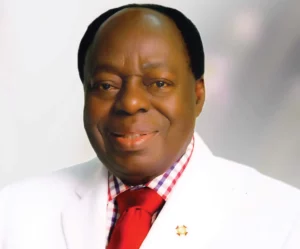Nigerian philanthropist funds £10m African education centre at King’s College London

A Nigerian philanthropist has donated £10 million to King’s College London to establish a centre that will provide young Africans with better access to education and opportunities.
The Aare Afe Babalola African Centre for Transnational Education will offer blended and online programmes, ensuring access to students who have had their journey to higher education disrupted by conflict, displacement, or other transitions.
It will also offer post-graduate level modules which can be brought together to create professionally recognised qualifications from diplomas to Masters degrees.
The funding by Afe Babalola will also provide scholarships to support bright students who would not otherwise be able to access these programmes, generating valuable knowledge about the nature and impact of transnational education on Africa’s development, according to King’s.
The 93-year-old lawyer, who is worth around $680 million, founded the private Afe Babalola University in Nigeria’s Ekiti State in 2009.
The Nigerian benefactor said about his donation to King’s: “Partnering with King’s College London, to me one of the first universities in the world to appreciate the power of education to provide quality education for the under-privileged in the 1960s, is a project that is dear to my heart.
“This is the more so because education is the unquestionable panacea to ignorance, poverty, extremism, religious bigotry and tribalism among other vices.
“My contribution to this programme is a way of reciprocating what I benefitted from the laudable and unique External Degree Programme of the University of London in the 1960s, without which I certainly would have ended up an unsung farmer or at best the secretary of the local motor union.”
King’s said that a bespoke programme for Africa would be developed in partnership with the University of London and an alliance of leading African universities.
“Modules will focus on topics that give talented young people society-relevant knowledge and skills that can improve their own lives, their communities, and their futures – such as law, health, engineering, peace and security, and leadership,” King’s said.
“This vision is inspired by Afe Babalola’s own experiences of growing up without easy access to high quality education and benefitting from the transformative power of remote learning.
“This allowed him to study from his home in Nigeria and to graduate with degrees in economics and law from the University of London,” King’s added
Professor Shitij Kapur, President and Principal of King’s College, said: “This partnership reflects a shared belief by King’s and Aare Babalola in the power of education and its role in service to society – the ethos upon which King’s was founded nearly 200 years ago.
“More than 450 million African youth are between the ages of 15-35, with less than 10 per cent enrolled in post-secondary education, making the issue of access to quality education all the more urgent.
“We are delighted that Aare Babalola’s donation provides a valuable opportunity to strengthen and grow our work with partners in Africa and deliver transformative education within the region,” Professor Kapur added.
King’s noted that its partnership with the University of London would build on “long-standing commitment to Africa and a legacy of working in true collaboration with African academics and institutions to deliver education and impactful research partnerships in the region for the benefit of all”.
A key example of this, is the African Leadership Centre (ALC), which was established at King’s and in Kenya in 2010, in collaboration with the University of Nairobi, to “develop a new community of African leaders, generating cutting-edge knowledge for peace, security and development in Africa”.
Professor ‘Funmi Olonisakin, Vice-President International, Engagement and Service, and Professor of Security, Leadership and Development at the ALC, said: “Driven by our shared vision for youth education in Africa, the Afe Babalola African Centre for Transnational Education will deliver an enduring legacy for Africa’s talented young people: access to life-changing, society-relevant, and work-ready educational opportunities.
“The programme has been informed by rich consultation with our longstanding partners in Africa and rigorous research activity to understand the complex underlying challenges and will be delivered at a scale that allows us to target and meaningfully reach underserved communities, wherever they are located,” she added.
King’s has also developed a new doctoral programme in engineering in collaboration with the Makerere University in Uganda, launched earlier this year, providing innovative training with industry placements.
A joint PhD in Engineering is in development with the University of Pretoria in South Africa, building on a successful joint programme in Leadership and Security Studies.
Further, King’s Global Health Partnerships works with health facilities, academic institutions and governments to strengthen health systems and improve the quality of care in four countries: Somaliland, Sierra Leone, Democratic Republic of Congo and Zambia.
In the case of the University of London, it also has had a long-standing relationship with Nigeria’s National Universities Commission, which co-delivers annual symposia for higher education leaders.
Professor Wendy Thomson, Vice-Chancellor of the University of London, noted: “The partnership and resource made possible by this generous gift from Aare Babalola offers a timely opportunity for us to develop transnational education programmes for young Africans in collaboration with King’s College London and a network of African institutions, that would not otherwise be possible.
“We are deeply grateful to Aare Babalola for his foresight and appreciation of the value education brings to personal and social development.
“Through the centre being established in his name, we will develop quality transnational programmes that will leave an enduring legacy,” Professor Thomson added.
Source: GNA
